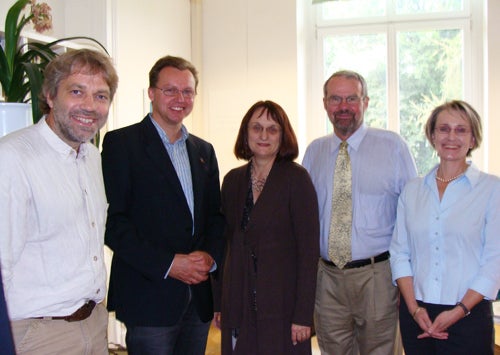Graz and UCAR
A new international affiliate joins the fold
Nov 3, 2010 - by Staff
Nov 3, 2010 - by Staff
2 November 2010 • From the program’s outset, international collaboration has been at the heart of COSMIC (the Constellation Observing System for Meteorology, Ionosphere and Climate), whose project office is based at UCAR. Launched in 2006, the six-satellite network, which intercepts GPS signals to measure weather, climate, and space weather variables, emerged from a partnership between the United States and Taiwan. Universities and laboratories from more than 50 countries around the world are now using data from COSMIC and other radio occultation (RO) projects for operational forecasting and climate research.
One of the leading collaborators on COSMIC is now UCAR’s latest international affiliate. The University of Graz, based in southeastern Austria, became the 52nd member this summer. With participants on every continent but Antarctica, the International Affiliates Program, or IAP (www.ucar.edu/governance/iap) serves as a vehicle through which institutions around the world dedicated to the atmospheric and related sciences can network with UCAR and each other. Membership is free; to learn more about joining, contact Susan Friberg (friberg@ucar.edu).
“The program is a nice way to give universities added visibility in the international community,” says UCAR president Richard Anthes. In September he paid a visit to Graz to deliver the keynote presentation at the fourth RO workshop in an international series hosted there since 2002. The visit also served to formalize Graz’s new UCAR affiliation and strengthen ties with faculty at the university’s Wegener Center for Climate and Global Change. The 40-member staff of the WegCenter, founded in 2005, is drawn from both natural and social sciences.
Among other WegCenter activities related to COSMIC, Andrea Steiner and colleagues recently used RO data to successfully infer temperature trends in the tropical upper troposphere and lower stratosphere. “The performance of the still-short RO record to date underpins its quality,” she says. Steiner and several other WegCenter scientists, including Gottfried Kirchengast and Ulrich Foelsche, have spent extensive time visiting UCAR in Boulder over the last several years. Most recently, Barbara Scherllin-Pirscher arrived this autumn for a one-year postdoctoral visit. She is comparing RO data from various satellites and processing centers for the lower and middle stratosphere, where signal-to-noise ratio declines. “Different centers have different solutions to deal with the degradation of RO data at high altitudes,” she says, “and it is important to understand the effects of these differences on the climate data.”
WegCenter director Kirchengast points to recent cross-campus broadening of the center’s activities in environmental and global change research as a sign of the potential for enhanced collaborations with UCAR and other international affiliates. “It is very fitting we now join IAP,” he says.

Pictured with UCAR president Richard Anthes (second from right) are Ulrich Foelsche, Gottfried Kirchengast, Roberta Maierhofer (vice rector for international relations and interdisciplinary research), and Andrea Steiner, all of the University of Graz.